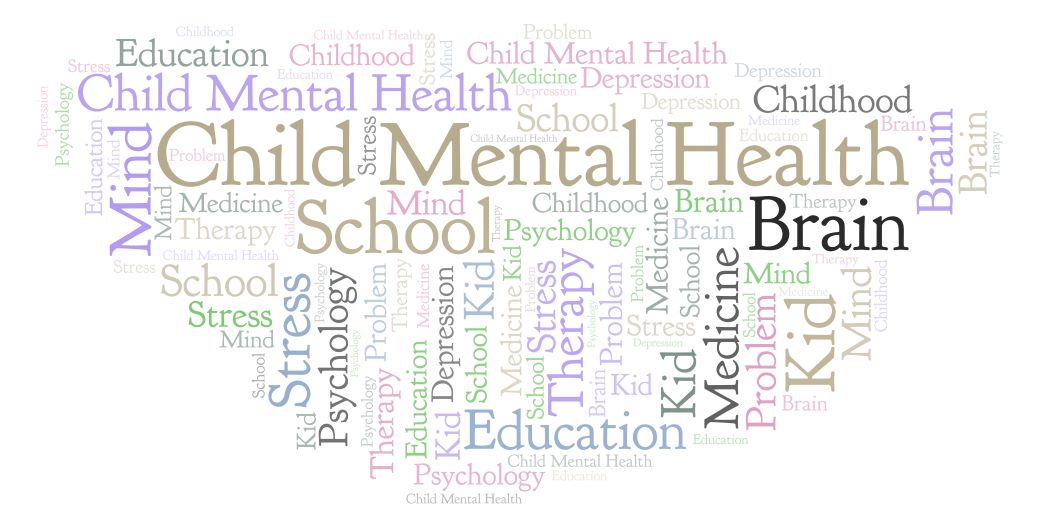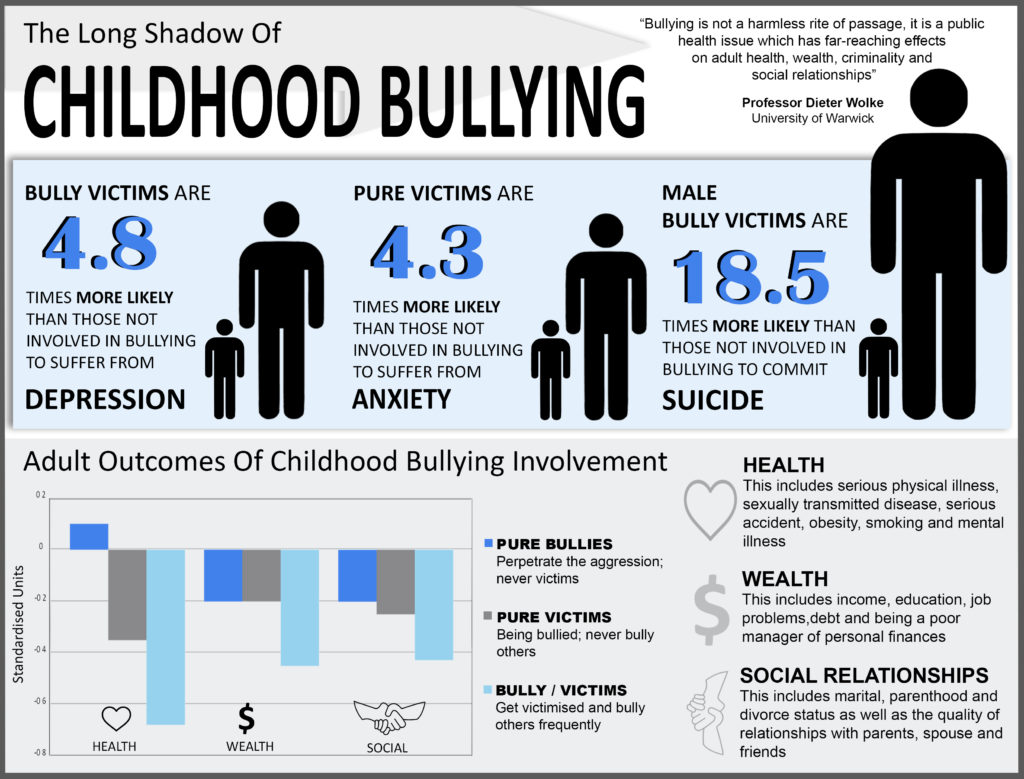Bullying and Mental Health

The mental health of students is a topic not often discussed or addressed in the school setting, particularly when related to bullying, and can be detrimental to the students’ overall experience.
Early Signs and Mental Health Awareness
It is extremely important to recognize early signs of distress; we may see our children and students withdrawing from activities or friends they once loved. While this is a natural part of growing up, it should be an important talking point to ensure it isn’t related to bullying or other mental health factors.
A study by de Souza, M., & McLean, K. (2012) presents acceptance methods to neutralize bullying. Instilling things like comradery, spiritualism, empathy, and acts of kindness allowed students to build a sense of connection to each other regardless of race, creed, or social status. Educators reported more awareness of kind acts among students and showcased those, while students showed more willingness to show appreciation for people and situations they hadn’t previously, without seeking reward or gratification. By making ‘kindness’ language a part of the classroom vocabulary, students were encouraged to reflect on their own behavior and identify things to be corrected.
Giving more attention to the mental health of students, especially those involved in bullying, can help prevent long-term difficulties such as internalized victimization from those being bullied, apathy from bystanders and defenders, and resentment or continued aggression from the antagonist. In the case of victims of school bullying, we see this play out as internalized victimization, avoidance, and withdrawal from social contact.
According to Hong, J. S., Espelage, D. L., & Rose, C. A. (2019), there is a strong association between cyberbullying and mental health problems. This could potentially lead to a lack of emotional intelligence and physical health issues, including but not limited to asthma, obesity, anxiety conditions, and rhinitis.
Long-term Effects of Bullying
They also show that parental and peer support throughout victimization were very effective and important protective factors. If a child doesn’t have a solid support system or people willing to listen to them about their experience, it can lead to feelings of unworthiness, isolation, and lack of motivation. Left alone, this can turn into depression or other mental disorders that require professional treatment. Without this treatment, we see these children becoming underdeveloped and dysregulated into adulthood, seeing themselves as victims in many life situations, preventing them from accomplishing all they could in a healthier environment.
We can also see this present as a former victim of bullying turning into a bully themselves, using the aggression as an outlet in an attempt to protect themselves. Again, left unchecked, this can create adults who have little respect for others and show empathy only for those they relate to.
In the following infographic, Professor Wolke, alongside Dr.William E. Copeland of Duke University Medical Center, investigated the impact on all those affected; the victims, the bullies themselves, and those who fall into both categories; ‘bully-victims’.

Illustrated by Professor Wolke and Dr. Copeland, “the numbers further demonstrate the scale of the problem. ‘Bully-victims’ were 4.8 times more likely to suffer from depression in adulthood than those who weren’t exposed to bullying.”
Male victims of bullying were 18.5 times more likely to commit suicide than those who hadn’t experienced bullying.
Professor Wolke expressed, “The results show that bullying victims are perhaps the most vulnerable group of all. This group may turn to bullying after being victims of bullying themselves as they lack the emotional regulation, or the support, required to cope with it.”
The Role of Bystanders in Bullying
Bystanders in bullying can have different effects on the outcome and present negative traits such as apathy. Clark et al. (2022) show how a bystander defending a victim can encourage others to not participate in this behavior and even see it as wrong. On the other hand, bystanders who laugh or attempt to encourage bullying are oftentimes already dealing with mental health issues that have not been addressed. As peers are one of the more important aspects of adolescent socialization, bystander action can play a large role in the outcomes of peer aggression. Because of these findings, it is all the more important to pay attention to every child, not only victim or bully, to prevent greater issues from arising. In this fashion, we can encourage better peer resolution and identify areas where behavioral changes are needed.
When bystanders see their peers being assaulted and no aftercare or corrective counseling is given, it breeds discontent in the social setting, and the divide grows. This can affect the bystanders and defenders in the long-term by internalized victimization or feeling they have no control over their environment. This can translate into adults who have underdeveloped social and professional skills.
Aggressors and Discipline
In the case of aggressors, it is important to understand the situation before dealing out punishment to prevent any build of resentment. Whether the cause of bullying comes from prior victimization, struggles with home life, or socio-economic differences, every effort should be taken to understand the behavior before a punishment is given.
When a student is suspended without any sort of behavioral counseling, it does very little to change the behavior in the future. A review presented by Huang, F. L., & Cornell, D. G. (2021) shows how zero-tolerance policies (when all involved in an altercation are suspended regardless of if they were the aggressor, defender, or victim) do not help with feelings of safety in schools for students or teachers, and lead to higher suspension rates. Though it is proven this method does nothing to prevent further bullying, 74% of educators are in favor of it. They also warn of teacher bias in how they handle occurrences of bullying. It is recommended that a school psychologist sign off on appropriate action before any punishment is handed out.
Huang, F. L., & Cornell, D. G. (2021) concludes that zero-tolerance forms of discipline should only be used in extreme instances and only after consultation if the goal is to build a safer school environment. Rather than harsh punishments, they encourage educators to form a plan involving evidence-based, mental health-focused forms of effective discipline. If the child doesn’t understand why they are being punished in a certain way or doesn’t believe their actions were really that harmful, any punishment given will be counterproductive. However, when a student has an understanding of the harmful act committed and is shown how to access empathy for their peers, punishment is typically accepted by the student, and amends can be made.
Bullying: Past to Present
In the past, bullying wasn’t as big of a concern as it is today. Kids might rough house or tease on the playground, maybe even get in fights after school ending with them shaking hands and the issue is resolved. Bullying was seen as something to build character and metal—a way that kids gained backbone and strength. Even in the home with siblings or other family members, bullying has been something that is accepted. In some cases, the victim would even be shamed for letting bullying affect them rather than fighting back. This has been a part of growing up for many parents and school officials.
Kochenderfer-Ladd, B., & Pelletier, M. E. (2008) shows how the beliefs teachers have about bullying are still very much in line with this way of thinking. We see educators who feel bullying is just a fact of life and do little to intervene, while others feel students should work it out on their own and be assertive. Both of these responses have shown little to no effect on improved relations in school. Another common stance is avoidance, with teachers telling students to stay clear of mean kids and they won’t get bullied. This is possibly the most unhelpful type of teacher involvement as it does nothing but add to feelings of victimization for the students.
Times have changed significantly in the last 10-20 years; with advancements in technology and the prevalence of social media, bullying has become something that is inescapable to many youths, even in their own homes. This has caused many dangerous situations in schools across the nation and across the world. With the ever-looming threat of self-harm and school shootings, simply hoping that these issues will work themselves out with a few encouraging words is no longer a feasible solution. The only option now is to give our children and students the tools and support to work through these things on an emotional level. If we can teach them proper coping skills, emotional regulation, and empathy in a way they can understand, we will begin to move in the right direction; One of acceptance of the self and others.
Bullying Effects on Mental Health
Monitoring the mental health of children at home and in the school setting is the most important aspect of creating a safe learning environment for all. As we now know, the effects on victims of bullying are extremely detrimental to overall wellbeing and can translate into severe depression and aggressive behavior without proper guidance. In the case of aggressors, we see negative results from traditional punishments that do very little to change the behavior and sometimes even amplify it.
Even bystanders are not safe from the effects of an unhealthy environment, leading to feelings of seclusion or an unwillingness to help or engage with their fellow students. When viewed as a whole, this could transform students into adults living in a survival mode with little concern or care for others, unable to form meaningful connections with their peers. Garwood, J. D., & Gage, N. A. (2021) presents a study on the combined efforts of using threat assessment procedures in conjunction with mental health awareness and coaching to help identify students who may be at greater risk of aggressive behavior and underlying mental health difficulties. This method can help parents and school officials formulate plans for how to proceed with various students with different needs.
When we send our children to school, we tend to get a sense of security. We believe that they will be safe while at school, and no harm should fall upon them as their teachers are watching for any worrisome behaviors. This is only true if we take the appropriate caution and action in the home and school setting. As parents or family members, we provide our children with a basic understanding of how the world works, but we tend to not recognize the full harm that others can bestow on their mental health. We must be sure to also teach our children of their value outside of accomplishments and accolades to give them the confidence needed for mental stability.
We must remember that these individuals will spend only a fraction of their life as children, a majority of it as adults who are expected to be productive and have adequate emotional control. They cannot accomplish this without those around them showing them the way. Children must be taught how to handle their mental health; It doesn’t happen naturally without guidance. We owe it to these kids and ourselves to give them the best possible chance to live a happy and productive life, free of self-doubt, anxiety, and feelings of being less than their peers. An empathetic and confident child creates an adult who can accomplish greatness.
Clark, K. N., Eldridge, M. A., Dorio, N. B., Demaray, M. K., & Smith, T. J. (2022). Bullying, Victimization, and Bystander Behavior: Risk Factors Across Elementary–Middle School Transition. School Psychology, 37(1), 37–46.
de Souza, M., & McLean, K. (2012). Bullying and Violence: Changing an Act of Disconnectedness Into an Act of Kindness. Pastoral Care in Education, 30(2), 165–180.
Garwood, J. D., & Gage, N. A. (2021). Evidence for the Technical Adequacy of the Risk Assessment and Distress Recovery: Examining Risks While Avoiding Profiling Youth With Mental Health Difficulties. Journal of Psychoeducational Assessment, 39(6), 694 711.
Hong, J. S., Espelage, D. L., & Rose, C. A. (2019). Bullying, Peer Victimization, and Child and Adolescent Health: An Introduction to the Special Issue. Journal of Child & Family Studies, 28(9), 2329 – 2334.
Kochenderfer-Ladd, B., & Pelletier, M. E. (2008). Teachers’ Views and Beliefs About Bullying: Influences on Classroom Management Strategies and Students’ Coping With Peer Victimization. Journal of School Psychology, 46(4), 431–453.
Huang, F. L., & Cornell, D. G. (2021). Teacher Support for Zero Tolerance Is Associated with Higher Suspension Rates and Lower Feelings of Safety. School Psychology Review, 50(2–3), 388–405.






